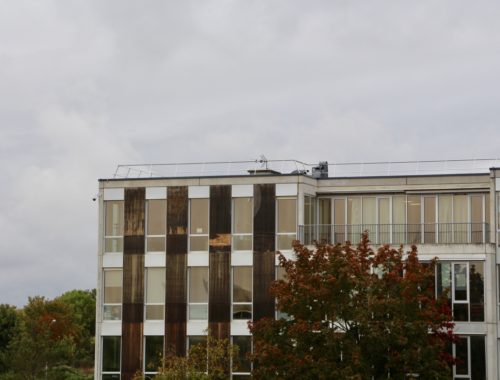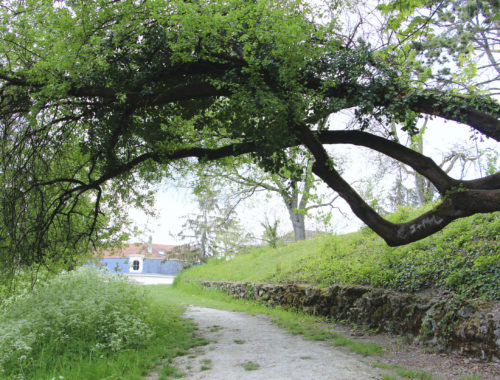
Five Great Reasons To Do an Alternance in France
Before I began my master’s degree in France as an American, I became interested in the idea of participating in the popular work-study scheme known as an alternance. Doing your studies en alternance involves switching between attending classes and going to work throughout the school year. During the second year of my master’s degree in Production, Logistics, and Procurement Management: Sustainable Logistics and Supply Chain Management at the Université de Reims Champagne-Ardenne, I oscillated between one week of class and one week of work. Though it was challenging to keep up with both my academic and professional obligations, I don’t regret my choice to do an alternance, and it’s an experience I would recommend to other foreigners in France. To learn five reasons why you should consider completing your degree in France en alternance, keep reading!
1. Get Professional Experience
Getting professional experience during your degree program in France is a great way to set yourself apart on the job market. While employers like to see that you’ve got relevant knowledge from your coursework, they also want you to have the skills to go along with it. A degree program en alternance will allow you to get both in a seamless manner. Unlike struggling to fit in shifts at a side job that has little to do with your desired field, an alternance is a useful professional experience that’s already built into your academic schedule. You don’t have to worry about any scheduling conflicts and the expertise you gain will look great on your CV.
2. Make Good Money
Another huge perk of doing a program en alternance is the pay. Many foreign students need to generate income to support themselves during their studies, and doing an alternance can help tremendously. At the very least, alternants are paid a percentage of the SMIC (minimum wage) according to factors such as age and year of studies. However, companies are free to pay even more if they so choose! In addition to your remuneration, you can take paying your tuition off your to-do list because your employer is responsible for covering those fees.
3. Gain Employee Status
While doing an alternance in France, you’ll enjoy having student status and all the perks that come with it while simultaneously having full-time employee status! This means that you’re entitled to every advantage that any other full-time worker at the company gets. Personally, I accumulated vacation days every month, used four days of marriage leave for my wedding in Reims, and was even part of the employee profit-sharing plan. When you’re simply a stagiaire, you often miss out on many of the benefits awarded to alternants.
@the_francofile A day in my life as an American grad student in France who gets paid to go to school. 💰✅ #alternance #workstudyprogramme #internationalstudent #americaninfrance #frenchlife #moveabroad #lifeabroad #studyabroad #mastersdegree #gradschool #france #reims #expat #immigrant ♬ Lazy Sunday – Official Sound Studio
4. Create Relevant Connections
Although doing an internship can help you make relevant professional connections, doing an alternance all but guarantees growing your network! Typically, internships in France last from one to six months, which is not always long enough to create meaningful, enduring relationships. However, alternances often last anywhere from one to three years, giving you more time to get to know your managers and coworkers, make significant contributions to long-term projects, and brush shoulders with more than just the people you work with on a daily basis.
5. Exercise Your French
An additional reason to do an alternance in France is that you’ll have the opportunity to perfect your French. During my time as an alternant, I was exposed to tons of industry-specific vocabulary that helped me to successfully defend my rapport d’alternance (work-study report), talk about my experiences with ease in job interviews, and seamlessly integrate the French workplace following graduation. Spending eight hours a day with francophone colleagues improved my conversational French as well, since nobody wants to talk strictly boulot (work) all day.
For all of these reasons and more, doing an alternance was arguably my favorite part of pursuing higher education in France. Though it’s not the traditional method of completing graduate school, I wouldn’t have had it any other way! If you’re looking to give yourself a competitive edge while making money and furthering your education, you should absolutely consider an alternance. Have questions or want to know more about my experience as an alternant in Logistics and Supply Chain in France? Let me know in a comment!
You May Also Like

Applying for a Master’s Degree in France: Phone Interview Secrets
November 4, 2020
Reasons We Chose to Study Law and Logistics in France
May 12, 2021


6 Comments
Samantha Mauter
Hi!
I just came across your blog today and it’s literally the answer to my prayers haha.
I recently researched a bunch of private universities in France, thinking that was my best option to get a masters in France but decided against it because of the insanely high price tag. After reading your guys’ post on public vs private universities, I realized that public universities are a great option and I’m so thankful for that information!
My main question is for Jalen, how did you go about researching schools that offered an alternance? I’m having a tough time finding many options when I try to search “master marketing en alternance” in Google. I feel like getting a masters with an alternance is the perfect fit for me as it is a way to pay for my studies and at the same time network while I would have the privilege of a student visa.
I’m hoping to find some places to potentially apply to, as I feel like simply having an undergraduate degree is not sufficient for a foreigner to find a job in France since almost everyone goes to university as an undergrad due to the low cost. And please correct me if you feel differently!
I have a good amount of time to research this as I’m going to do TAPIF this upcoming fall, so I definitely will be reading all of your guys’ articles on that!
Thank you in advance for your help!
Jalen & Maria
Hello, Samantha! We are glad that you came across our blog and that it’s exactly what you were looking for.
There are many master’s in France that offer either one or both years en alternance. A great place to start would be Mon Master. Here you can search for programs by discipline and method of instruction.
We believe that having master’s degrees in our fields helped us immensely during the job search in France. While some people do find work with just an undergraduate degree from their home country, we personally wanted to stack the odds in our favor as much as possible.
Good luck with your TAPIF year and preparing your master’s degree applications! Don’t hesitate if you have more questions.
Joseph Perez
I am interested in moving closer to my sister and my family in France and the UK. Born and raised in the US, but looking at ways to make my move somewhat doable, I have thinking of getting my masters in France to make it happen. I’m “learning” French but am so green I’m a blade of grass. I saw your videos and read your blogs hoping you can help guide me in the right direction to make it happen and I was very interested in the work/study program. Sounds like something I would want to pursue. Thank you for your time.
Kind regards,
Joseph Perez
Jalen & Maria
Hi, Joseph. Thanks for reading. Doing an alternance is indeed a great opportunity for students in France! Feel free to peruse our content about our master’s degrees and message us if you have any specific questions! Good luck!
Leasa
I just love your videos, you have answered so many questions. Where can I find more information about the alternance? I have read that you have to live in France for up to a year before you can enter into that program but I have not found enough details to know if the first year (M1) would suffice.
Also, where can I find a list of high demand degrees? I believe you made a suggestion in one of your posts about this making it easier to find employment after the masters is complete.
Thanks.
Jalen & Maria
Hello Leasa, thank you! You can find more information about doing an alternance from official sources like Campus France (https://www.campusfrance.org/fr/travail-etudiant) or the French government website (https://www.service-public.fr/particuliers/vosdroits/N11240).
As far as your eligibility to do a program en alternance as a foreign student in France, Article R5221-7 du code du travail gives a clear explanation (https://www.legifrance.gouv.fr/codes/article_lc/LEGIARTI000043325673).
Yes, we did suggest that choosing a program that will give you in-demand skills could help make you a more competitive candidate on the French job market following your studies. You can use Google for recruitment projections in different sectors/jobs. France also publishes a list of jobs per region that are en tension. This can give insight into what professions are needed in different areas of the country, but have a hard time finding talent (https://www.legifrance.gouv.fr/jorf/id/JORFTEXT000043317444).